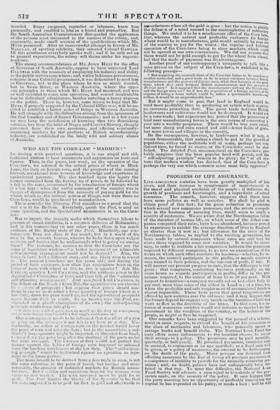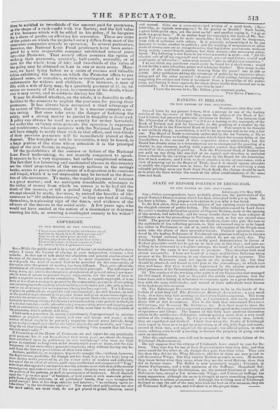PROGRESS OF LIFE ASSURANCE.
LIFE-ASSuRANCE societies have been greatly multiplied of late years, and their increase is symptomatic of improvement in the moral and physical condition of the people : it indicates the growth of prudence and forethought, and a superfluity of actual resources. The remark, however, supposes that there have been more policies as well as societies. We shall be glad to obtain proof of this fact; for the great reduction in premiums which several new companies announce, and the severe competi- tion in the business of assuring lives, would seem to imply a scarcity of customers. 'We are aware that the Northampton tables of the duration of human life, on which some of the oldest com- panies computed their rates, have been abandoned, because proved by experience to exhibit the average duration of lives in England as shorter than it now is ; but allowance for the error of the Northampton tables, as applied to the existing generation, has been made by several companies whose rates are still very far above those required by some new societies. It would be neces- sary, in order to institute a fair comparison between the premiums required by different companies, to go into an examination of the terms on which each office conducts its business—whether, for in- stance, the insured participate in the profits, or merely receive a suns named in their policies, and the amount of profit, if any. It will answer our present purpose to state, that the difference is very great ; that companies, conducting business professedly on the same terms as regards participation in profits, diffor in the pre- miums required, to the extent of front 15 to 20 per cent. With respect to annuities—a company recently set on foot offers fully 25 per cent. more than some of the oldest in London ; at a time, too, when the profitable and safe employment of accumulated funds is almost impossible. These facts prove that great temptations are offered by new societies over the old ones; and it may happen that the former depend for support very much on the business which was wont to flow in the direction or the latter. In that case, tens- crease of assurance societies would not indicate so marke I an im- provement in the condition or the country, or the habits of the people, as might at first be supposed. Our remarks have been suggested by the perusal of a scheme, novel in some respects, to extend the benefit of lire-assurance to the class of mechanics and labourers, who generally resort to savings banks and benefit clubs. The National Loan Fund Soe ciety Lifers many inducements to the humbler classes to invest their savings in a policy. The premiums may be paid monthly, quarterly, or half-yearly. By periodical payments, annuities may be secured, to commence at an age specified ; or a fixed sum will be given, or a policy of assurance, the amount to be forthcoming on the death of the party. Many persons are deterred from effecting assurance by the fear of losing all previous payments m consequence of inability to provide for the annually-recurring pre- mium ; and, no doubt, policies have not unfrequently been for- feited in that way. To meet this difficulty, the National Lsaa Fund Society will advance a sum equal to two-thirds of the pay- ments made, on the security of the policy. It may happen that the party assuring has an opportunity of profitably
employing the capital he has expended on his policy, or needs a loan ; and he will then be entitled to two-thirds of the amount paid for premiums, M the shape of a cash-credit with tl:o Society, and the full value of the bonuses which will be added to his policy, if he bargains for a share of profits on effecting his assnrance. These are some of the points on which the projected society differs from most of the assurance companies already in operation. In several particulars. however, the National Loan Fund gentlemen have been antici- Pa ted by a very respectable company established several years ,
ogo-.-the Promoter. That society offers assurers the option of making their payments, quarterly, half-yearly, annually, or at once for the whole term of life; and two-thirds of the value of the policy may be obtained on lean in one or more sums. More- over, we have lying before us a series of curious and valuable tables exhibiting the terms on which the Promoter offers to pay deferred sums, or annuities, certain or contingent, and to secure endowments for widows and children. For instance, a man of fifty with a wife of forty may, by a quarterly payment of I/. 3s. 9d. secure an annuity of IV/. a year, to commence at his death, when- ever it may occur, and to continue during her life.
It may be doubted whether, on the whole, it is desirable to offer facilities to the assurers to neglect the provision for paying their premiums. It has always been accounted a chief advantage of the system of life-assurance, that it in a manner compels a cer- tain saving. But once take away the danger of forfeiting the policy, and a strong motive to persist in frugality is destreyed. A policy can always be used as a security for money burrowed; but under the ordinary arraegements the operation is expensive and troublesome, whereas assurers with the National Loan Fund will have simply to notify their wish to that effect, and two-thirds of their previous payments Will be immediately placed at their disposal. The temptation will be irresistible, it may be feared, to *large portion or the class whose attention it is the principal object of the new Society to engage.
Of the probabilities of the success or failure of the National Loan Fund undertaking, we are scarcely competent to speak. It appears to be a very ingenious, but rather complicated scheme. The fact that the labouring and mechanical classes in this country are the chief proprietors of the twenty millions in the savings banks, seems to prove the prevalence of a disposition to be cautious and frugal, which it is not impossible may be turned in the direc- tion of life-assurance. To many, the regular payment of interest is a great matter ; and we anticipate considerable reluctance to the outlay of money from which no return is to be had till the death of the asstner, or till a period long deferred. That the attempt should be made, however, to extend the benefits of life- assurance to" the industrious classes," as they are fond of calling themselves, is a pleasing sign of the times, and evidence of the advance of the masses in the social scale. A few years ago, who would not have smiled at the notion of a shoemaker or drayman assuring his life, or securing a contingent annuity to his widow ?



























 Previous page
Previous page